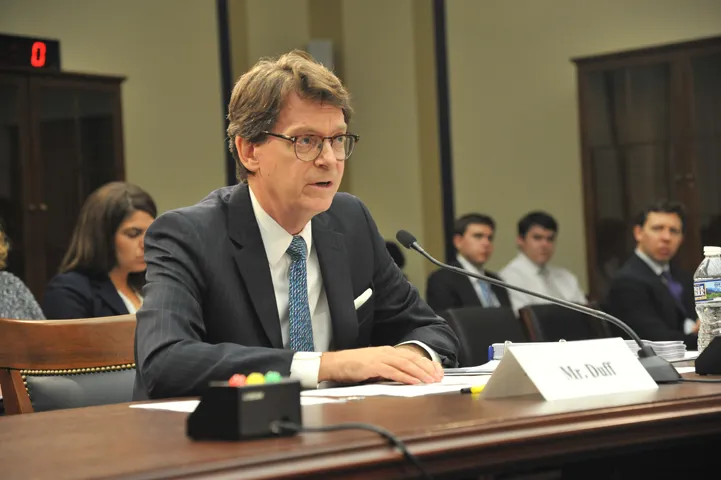Communication with Congress about Judicial Conference goals, policies, and positions forms the foundation of the Judiciary’s relationship with Congress and its committees while enhancing the Judiciary’s role as a coequal branch of government.

AO Director James C. Duff stressed the Judiciary's commitment to being a "good steward" of federal funds at a House hearing.
Congressional Testimony
In July 2016, Administrative Office Director James C. Duff appeared at a hearing titled “The Judicial Branch and the Efficient Administration of Justice” before the House Judiciary Committee’s Subcommittee on Courts, Intellectual Property, and the Internet. In his testimony, Director Duff discussed the case management practices that the Judiciary has adopted to improve efficiency, including efforts to make sure that best practices developed at the local level are shared at the national level. He also described the Judiciary’s strategy of efficiently managing public funds through innovative workforce and resource management practices, such as realistic budget formulation, cost containment, extensive auditing, space reduction, and efforts to enhance public access to the judicial process. Director Duff concluded his remarks by encouraging members of Congress, when they contemplate new legislation, to consider the impact of the legislation and to ensure the Judiciary has the resources to address any increased workload requirements on the courts and the federal indigent defense system.
In addition to Director Duff’s oral and written statements, a written statement was submitted by Chief Judge Rodney W. Sippel, chair of the Judicial Conference Committee on the Judicial Branch and chief judge of the Eastern District of Missouri.
Cameras in the Courtroom
Several bills were introduced in the 114th Congress that would allow cameras in federal courts. Members of Congress asked questions about the issue at a July 2016 hearing of the House Subcommittee on Courts, Intellectual Property, and the Internet that was called on the topic of “The Judicial Branch and the Efficient Administration of Justice.” None of the bills, however, were acted on.
Sentencing Reform
The Judicial Conference has long opposed — and supports reform of — mandatory minimum sentences. In March 2016, the Conference adopted a position supporting the retroactive provisions in two bills, S. 2123 and H.R. 3713, and requested the resources necessary for efficient and effective implementation. AO Director Duff, writing as the secretary of the Judicial Conference, sent formal letters to the chairmen and ranking members of the Senate and House judiciary committees expressing the Conference’s positions.
Congress considered sentencing reform legislation in 2016 but made little formal progress. In the Senate, S. 2123, the Sentencing Reform and Corrections Act of 2015, would have enacted reforms that included reducing mandatory minimum sentences in some circumstances and making some of the reductions retroactive. The bill also would have involved judges in the process of deciding whether a prisoner could serve a portion of his or her sentence on community supervision, known as “judicial parole,” which the Conference opposes. The bill passed the Senate Judiciary Committee in October 2015 but did not advance further in 2016. The House Judiciary Committee passed two separate reform bills (H.R. 3713 and H.R. 759), which contained elements similar to the Senate bill but also numerous technical differences.
Improving Resource Impact Analysis
During the budget process, the AO makes sure that Congress recognizes the uncontrollable nature of the Judiciary’s workload. It’s important that Congress consider the impact that new legislation has on the prospective workload and resulting costs of the federal courts. The official cost estimates prepared by the Congressional Budget Office (CBO) are a vital part of ensuring that resource-impact information related to the legislative actions of the authorizing committees gets to the appropriating committees when funding decisions are made.
In recent years, the Judiciary faced a serious problem when some CBO cost estimates did not take into account the substantial potential workload and cost burdens of several legislative proposals. The AO continued to make efforts in 2016 to improve the lines of communication and data sharing between CBO and the Judiciary, to ensure that the resource impact of proposed legislation is assessed and included in future CBO cost estimates.
Annual Report 2016
- Annual Report 2016
- Funding/Budget
- The Courts and Congress
- The Federal Bench in 2016
- Accountability and Resource Management
- Facilities and Security
- Public Outreach
- Court Operations and Case Management
- Defender Services
- Probation and Pretrial Services
- Human Resources
- Information Systems and Cybersecurity
- Recent and Proposed Amendments to the Federal Rules
- In Profile
